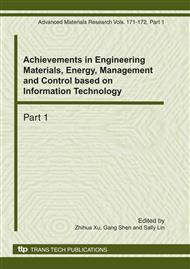p.408
p.412
p.416
p.421
p.425
p.429
p.433
p.437
p.441
Annual Performance of a Commercial Building with Liquid Desiccant Based Independent Humidity Control HVAC System in Guangzhou
Abstract:
Based on a new type of sprayed liquid desiccant total heat recovery device, a liquid desiccant system combined refrigeration system with the independent humidity control (IHC) strategy is presented, in which the entire latent load and part of the sensible load are removed by liquid desiccant fresh unit combining heat pump (LFUH). The air-conditioning cooling load of a commercial building is simulated by DEST software. And the energy consumption is calculated respectively for conventional air conditioning system and IHC system. Compared with ordinary systems, IHC system can achieve savings of about 20% of the power consumption per annum. In addition, the average coefficient of chiller performance (COP) can increase about 13.5%. The result sows that IHC system has better application prospects.
Info:
Periodical:
Pages:
425-428
Citation:
Online since:
December 2010
Authors:
Price:
Сopyright:
© 2011 Trans Tech Publications Ltd. All Rights Reserved
Share:
Citation:


